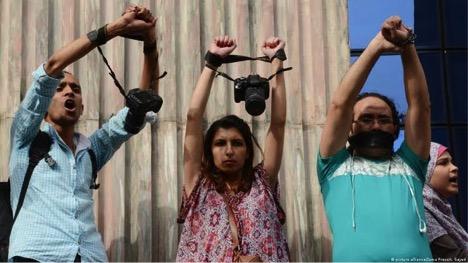Egyptian Law, Media and the Search for Brighter Days
Submitted by fkakooza on

There appears to be a paradox between what the regulatory environment in Egypt today and some of the provisions of the law governing the same.
Journalists, meanwhile, continue to yawn for better days for the profession as they struggle with the present and look to the past in search of the future.
Maha Salaheldin, a digital investigative and data journalist, expresses her discontent towards the current working environment for journalists.
“2011 and before were the brightest eras of journalism… Dozens of journalists won dozens of awards and produced dozens of investigations, but now it’s something we can only talk about.’’
Just like many countries Egypt has a constitution which guarantees freedom of expression and autonomy of journalists. However, many of the laws that aim to guarantee freedom of the press are practically inactive. This creates a gray gap which the government fills by passing and enforcing laws that aim to curtail freedom, including of the press.
The laws have been put to work with dozens of journalists arrested, some jailed within the decade following the 2011 uprising which forced President Hosni Mubarak to resign.
The laws
Egypt has a plethora of laws to regulate the media. They include the Constitution enacted in 2014, the press legislation, the penal codes, the press law number 96 of 1996 and the public law among others.
To understand how these pieces of legislation work, we spoke to Salma El Ghetany, adjunct instructor at the Department of Journalism and Mass Communication at the American University in Cairo.
Her response paints a clear picture of system giving with one hand and taking away with another hand. “Yes, journalists have a lot of rights provided by the constitution to report freely on all issues. They have the right to report on all issues, to protect the sources and to have access to all information.”
The above is in line with the Article 65 of the 2014 Constitution which grants freedom of thought, and freedom of opinion “through speech, writing, imagery or any other means of expression and publication.”
The bait in El Ghetany’s explanation is in what she says next: “However, when it comes to implementation of the law, this is not the case. There’s a lot of sensitivity…a lot of information is withheld with the justification that it is for the preservation of national security…”
El Ghetany says the same laws make it look so easy to open up and own a newspaper in Egypt. All one has to do is notify the national authority of media regulation and to have a minimum amount of money in the bank depending on whether the media house will be local, regional or national. But the restrictions that follow drive many out of it all.
In 2018, shortly after winning another term of office, President Abdel Fattah al-Sisi, adopted a set of laws to tighten his grip on the media landscape. The constitution provides for independent bodies to regulate the media sector but the new laws give the president wide ranging powers to directly appoint members of the Supreme Council for Media Regulation. The council has powers to issue or revoke licenses and to fine or suspend media houses.
Just as powerful are the National Media Authority whose role is to govern the state-owned broadcast sector and the National Press Authority to regulate the state-owned print and online outlets.
Through these bodies the government has a firm hand on the media. Records from the Tahrir Institute for Middle East Policy, a non-profit organisation which advocates for transparent, accountable and just societies, indicate that at least 550 news websites have been blocked since 2017.
Journalists can hardly express themselves freely without being jailed.
A source from AL Thenya Television who prefers to stay anonymous, says practicing journalism in Egypt is sometimes risky.
“As a journalist, sometimes I have to leave certain stories in order to protect my life and family. Sometimes we get phone calls from security agencies and the state telling us not to intervene in certain issues. My friend received a life-threatening letter and decided to quit journalism. That’s how we work. To be safe, we either speak less on a topic or ignore it completely if it can cause problems,” the source said.
Besides the Egyptian local laws, several international laws/treaties which Egypt signed also grant freedom of expression. Article 19 of the Universal declaration of human rights under paragraph two provides that everyone shall have a right to freedom of expression; this right shall include freedom to seek, receive and impart information or ideas of all kinds, regardless of the frontiers, either in print, art or through any media of his choice.
Egypt may be a signatory to various international laws that guarantee freedom of expression. It may have impressive domestic laws but the silence of these laws rings loud for every journalist.
When Salma El Ghetany says “we were moving in the field, photographing and documenting” in reference to 2011, she speaks for many who search for an elusive future in the past.
- 216 reads
